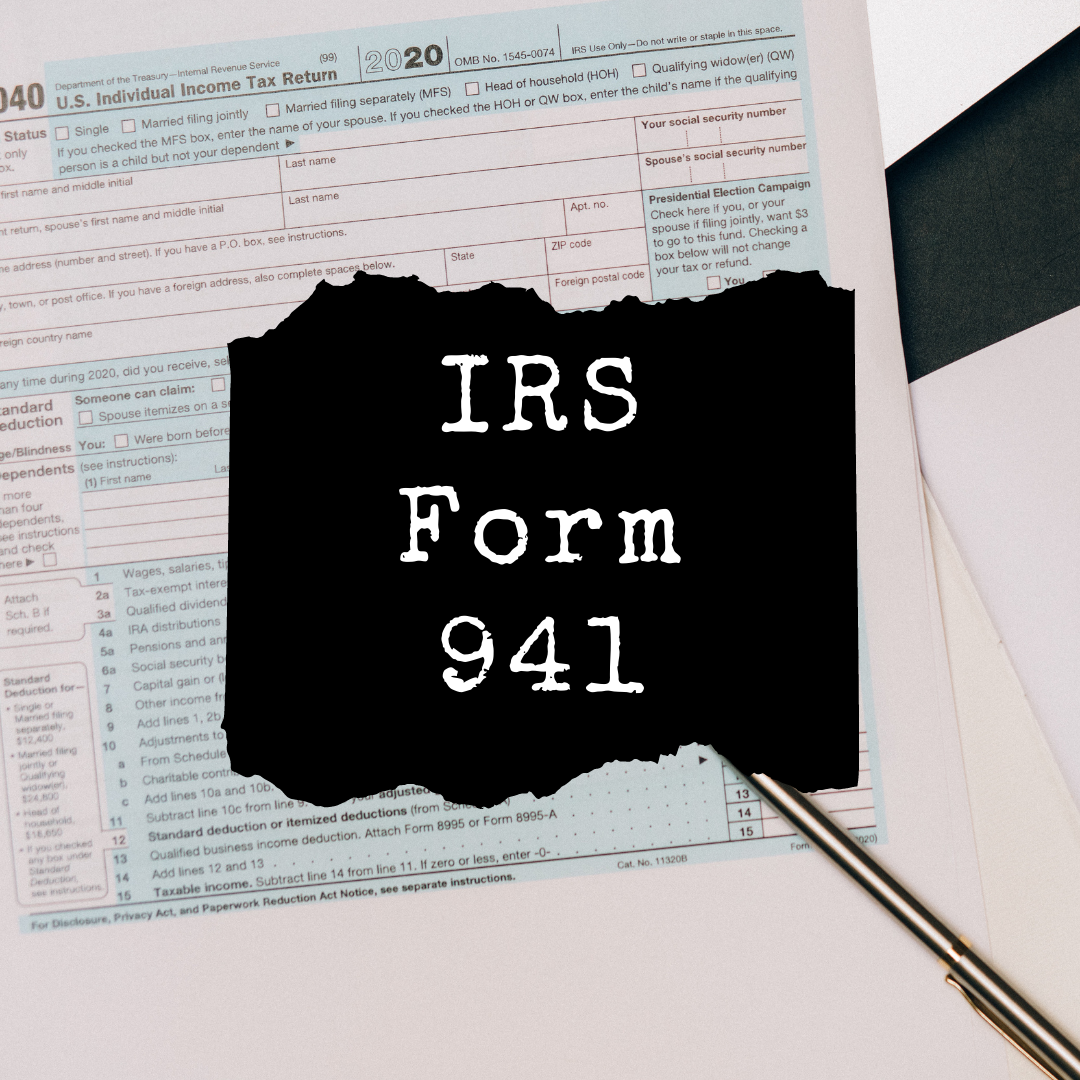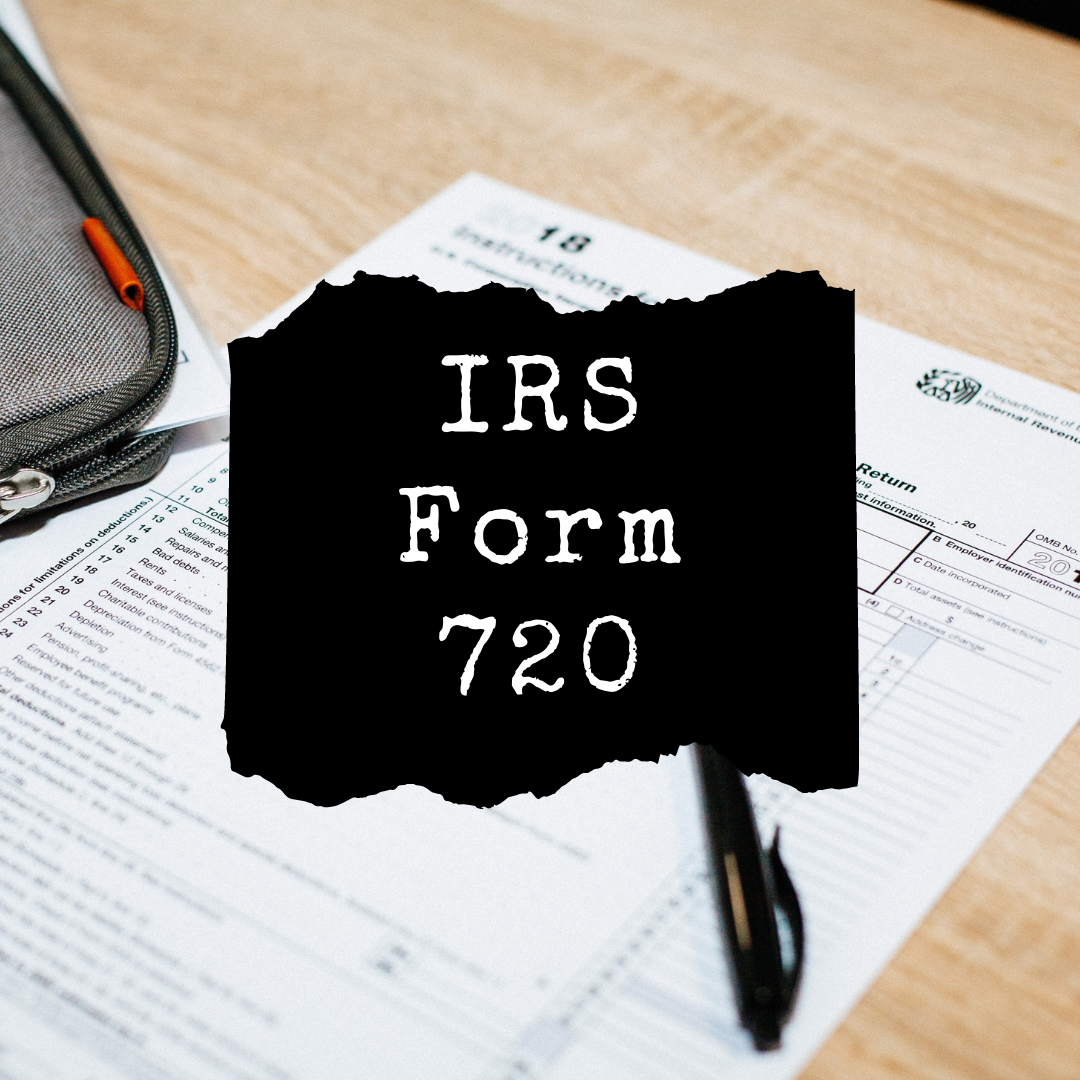IRS Form 720, the Quarterly Federal Excise Tax Return, is a tax form that is used to make federal excise tax payments. In case your business deals with goods or services that involve excise tax, you will have to report and pay those taxes through IRS Form 720. In such cases, it is necessary to file IRS form 720 quarterly.

What is an Excise Tax?
The tax imposed on specific goods or services such as alcohol, fuel, tobacco, etc. by the federal government is known as an excise tax. Certain goods on which excise tax is imposed are listed below:
- Airline tickets
- Alcohol
- Crude oil
- Coal products
- Automobiles
- Firearms
- Gasoline
- Gambling
- Tobacco products
- Bows and arrows
Who Should File Form 720?
You will have to file IRS Form 720 if you sell products that involve excise taxes. On the form, you will be able to find the list of all the goods or services that involve excise taxes. In case you don’t fall under this category, you won’t have to file Form 720. However, there are two other conditions that require you to file Form 720. Let’s take a look:
- You need to complete Form 720 if you are responsible for collecting federal excise taxes mentioned on Parts I and II of Form 720 for a previous quarter but you haven’t filed a final return.
- You need to complete Form 720 if you are responsible for collecting federal excise taxes mentioned on Parts I and II Form 720 for the current quarter.
No matter alcohol, tobacco, and firearms involve excise taxes, they are not included under IRS Form 720. These products are monitored by the Alcohol and Tobacco Tax and Trade Bureau. You need to file the taxes using the return form on their website.
When to Fill Out Form 720?
IRS Form 720 needs to be filed quarterly. Let’s take a look:
First quarter: January, February, March -April 30
Second quarter: April, May, June-July 31
Third quarter: July, August, September- Oct. 31
Fourth quarter: October, November, December-Jan. 31
In case the due date for filing Form 720 is on a Saturday, Sunday, or legal holiday, then the form can be filed by the next business day.
Paying your Excise Taxes
You need to make the payments for excise taxes semi-monthly. This implies that the first semi-monthly period refers to the first 15 days of the month and the second-monthly period starts from the 16th of the month and goes on till the last day of the month.
- In case you are required to pay excise taxes for communications or air transportation, then you can even pay according to an alternative schedule, again, as mentioned in the Form 720 instructions.
- You need to make excise tax deposits by electronic transfer (an ACH deposit) and submit it at least one day before the due date. For example, if the due date is January 15, then you need to submit the payment by January 14.
- In case the due date lies on a weekend or legal holiday, then the next business day will be the new deadline.
Where can you find Form 720?
IRS Form 720 is presented on the IRS website.
- There are two options for filing the form. Either you can first print the form, fill it and then mail it to the IRS, or you can first fill the form on your computer, print it, and then mail it to the IRS.
- IRS Form 720 can also be filed electronically by getting in touch with an accountant or tax preparer.
Form 720 Instructions
Let’s take a look at some of the steps that can help you in filing IRS Form 720:
1.Prepare Documents and Enter Business Information
Before filing IRS Form 720, you need to collect all the necessary documents. You need to have the details related to your business’s inventory, total sales, etc. Then you need to enter basic business information such as your name, address, date of the respective quarter, and your employee identification number, or EIN. This all should be included in Part 1.
2. Calculate the Relevant Excise Taxes
Then Part 1 of Form 720 needs to be completed. You need to mention if your business is required to pay the following taxes:
- Environmental Taxes: The taxes include: petroleum oil spills, imported petroleum products, ozone-depleting chemicals. In case you pay these taxes, then you are required to complete IRS Form 6627
- Air transportation and Communication taxes
- Fuel taxes: Kerosene, gasoline, diesel, natural gas
- Retail taxes: trailers, trucks, tractors
- Ship passenger tax
- Foreign insurance taxes
- Manufacturers taxes: tires, coal, “gas guzzler,” vaccines
In Part I, you will have to mention which products cater to your business. In case any product qualifies, then you will have to use the respective rate in the “Rate” column in order to calculate the taxes your business is liable for.
Then according to your total sales/units sold and the respective rate, you need to fill in your business’s tax responsibility in the “Tax” column. At the end of Part I, you need to add up all of the taxes and enter the total.
In case none of the excise taxes in Part I imply to your business, skip Part I and jump to Part II. However, in case your business has any tax liability in Part I, then you need to complete the Schedule A section of IRS Form 720.
2a. Compute the Net tax liabilities and Complete Schedule A
The Schedule A section needs to be completed in case you have a tax liability from any tax in Part I. If there is no liability from Part I but there is a liability for Part II, then you are not required to fill out Schedule A.
Schedule A determines your business’s net tax liability. In Schedule A, you need to mention the net tax liability for each tax for every semi-monthly period and then mention the total in the applicable box.
You will have to fill number 1 of Schedule A unless you are liable for any of the alternative methods taxes, as mentioned according to the relevant IRS numbers (22, 26, 28, or 27-in Part I). In case your business is responsible for any of those taxes, you need to complete number 2 of Schedule A.
3. Calculate relevant excise taxes and complete Part 2 of Form 720
You have to fill Part II of Form 720 in case your business caters to any of the following products or services:
- Specified health insurance policies
- Sport fishing equipment
- Electric outboard motors
- Bows and arrows
- Indoor tanning services
- Waterways fuel
Then you need to fill in Part 2 similar to Part 1. In case your business caters to any of the goods or services in Part II, you will have to calculate your tax using relevant sales documents and the rate in the “Rate” column. Then you are required to fill in the calculated tax in the “Tax” column and then add up the total at the end of Part II.
Remember that the tax for health insurance is calculated differently as compared to other categories. It is done by using the average number of lives covered, instead of units sold or total sales.
4. Determine whether you need to fill out Schedule T or Schedule C and complete these sections of Form 720
Prior to jumping to Part III, you will have to mention whether you need to fill out Schedule T or Schedule C of IRS Form 720. Both these schedules pertain to businesses that deal with fuel.
Schedule T
If your business produces or sells diesel fuel, kerosene, gasoline, or aviation gasoline, then you need to complete the Schedule T section of the form. This section determines the total taxable fuel gallons received or delivered in a two-party exchange within a terminal.
If you are the person who receives the fuel in a two-party exchange, then you are responsible for the tax levied on fuel removal from the terminal. In case your business deals with any of these fuel types, you will have to complete Schedule T.
Schedule C
This is similar to Schedule C. If you are responsible for taxes on Part 1 or 2, you will have to reduce the amount you owe by filing a claim on Schedule C.
Once you are done completing relevant columns in Schedule C, you will have to add your final total on the last Schedule C page and mention it on line 15. Then this total can be used to complete Part 3 of IRS Form 720.
5. Complete Part 3 of Form 720
Part 3 deals with calculating your total taxes by adding the totals from Part I and Part 2 and putting the sum in box number 3.
Once you complete Schedule C, you need to add the amount of your total claims in box number 4.
In box 5, you need to mention your excise tax deposits for the quarter. In case, you overpaid in previous quarters, you need to mention this amount in box 6 and box 7. Box 8 refers to the total of boxes 5 and 6, and box 9 refers to the total of boxes 4 and 8. If your total tax in box 3 is more than box 9, then you will have to mention the difference, which is your due balance, in box 10. This amount has to be paid along with your return filing of Form 720.
On the other hand, if box 9 is more than box 3, then you can mention what can do with the overpayment. Then, this amount has to be applied to your next return or get it refunded to you.
Lastly, you need to sign and date IRS Form 720. If you want to designate a third party to discuss your return with the IRS, you need to mention this in the “third party designee” section. If you use the services of accountant or tax professional, then you will have to fill the information in the “paid preparer use only” section.
6. File Form 720
Now you need to file Form 720 before the specified due date. There are two ways to do this.
- You can mail Form 720 directly to the IRS.
- Alternatively, you can file electronically if you want to complete the form through the IRS e-file program.
While filing Form 720, you should pay your balance due (from box 10 of Part 3).
- The balance can be paid with a direct debit, check, or money order.
- If you opt for filing electronically, then the payment should be done with a direct debit.
- If you want to file physically, you will have to complete Form 720-V; this payment voucher form will go along with your check or money order to pay out your due balance. You will then have to send Form 720-V along with your completed Form 720 while filing to the IRS.
Prior to filing Form 720, do not forget to make copies of your completed form for your reference.
Tips for filling IRS Form 720 more effectively
Keep in mind the below-mentioned tips if you want to streamline the process of completing the IRS 720 form:
Prepare Beforehand
If you want to avoid mistakes while completing tax forms, you should be organized. Always keep track of your inventory, sales, and other important metrics. For this, you can either use an accounting platform or seek services from an accountant or a bookkeeper. This will help you in keeping the information up to date, organized and complete. Additionally, maintain a diary where you can keep records of the semi-monthly excise tax payments and quarterly filing deadlines for Form 720. If you are not prepared beforehand, then the chances of errors will be higher, which can further result in penalties.
File Electronically
If you want to save your time, then you should opt for the IRS e-file program. Plus, you won’t have to rely on the mail system to meet your deadline. Also, you will be able to extract information easily, refer to the IRS filing instructions, check recent IRS updates when you file IRS electronically.
Hire a Tax Professional
Hiring a tax professional is a good option if you want to complete IRS Form 720 without any hassles. He will be able to fill the form more quickly and accurately owing to years of experience in his field. Furthermore, he will be able to solve any problems or issues that arise while filing the form.
How can Deskera Help You?
Deskera Books is an online accounting, invoicing, and inventory management software that is designed to make your life easy. A one-stop solution, it caters to all your business needs from creating invoices, tracking expenses to viewing all your financial documents whenever you need them.
Through Deskera Books, your accounting would be handled by it, with all that you would need to do is update your invoices, your account receivables, and accounts payable, and the operating expenses incurred as well as operating income earned on the software. In fact, you can even delete or edit the existing debit notes and credit notes, as is applicable.
The platform works exceptionally well for small businesses that need to figure out a lot of things when they are setting out. This delightful software allows them to keep up with the client’s expectations by assisting them in overseeing a timely delivery.
With the well-thought and well-designed templates, you can now anticipate your work to become simpler. These templates can be used for transactions like invoices, quotations, orders, bills, and payment receipts.
If yours is a drop shipping business, you can easily track your orders and create new dropship orders for your suppliers based on the customer orders.
Deskera People is another platform that enables you to expedite and simplify the processes. Through its automated processes like hiring, payroll, leave, attendance, expenses, and more, you can now unburden yourself and focus on the major business activities. It also assists with driving growth for your business by integrated Accounting, CRM & HR Software.
The entire setting up process on Deskera Books is super easy, with you having to only sign-up using your email address or social authentication, and half of your work would be done. Once you have registered on Deskera Books, you would get pre-configured accounting rules, invoice templates, tax codes, and a chart of accounts, to mention a few vital features. Lastly, your accountants can be added to your Deskera Books account for free by just inviting them to use the system.
With so many features at your disposal, making your accounting, reporting, and compliance easier, what are you waiting for?
Key Takeaways
- IRS Form 720 is a tax form that is used to calculate federal excise tax payments
- The tax imposed on specific goods or services such as alcohol, fuel, tobacco, etc. by the federal government is known as excise tax
- You will have to file IRS Form 720 if you sell products or services that involve excise taxes
- IRS Form 720 needs to be filed quarterly
- IRS Form 720 is presented on the IRS website
- There are certain instructions that need to be followed while filing Form 720
- Firstly, you need to prepare all the necessary documents and enter business information
- Then, you will have to calculate relevant excise taxes to complete Part 1
- Calculate the Net tax liabilities and fill out Form 720 Schedule A
- Calculate the appropriate excise taxes and fill out Part II of form 720
- Prior to jumping to Part III, you will have to mention whether you need to fill out Schedule T or Schedule C of IRS Form 720
- Part 3 deals with calculating your total taxes by adding the totals from Part I and Part 2 and putting the sum in box number 3
- Now you need to file Form 720 before the specified due date
- There are some tips that will help you streamline the process of filing Form 720
- Always keep track of your inventory, sales, and other important metrics and prepare beforehand if you want to avoid any errors while filing Form 720
- If you want to save your time, then you should opt to file Form 720 electronically
- Hiring a tax professional is a good option if you want to complete IRS Form 720 without any hassles
Related Articles











